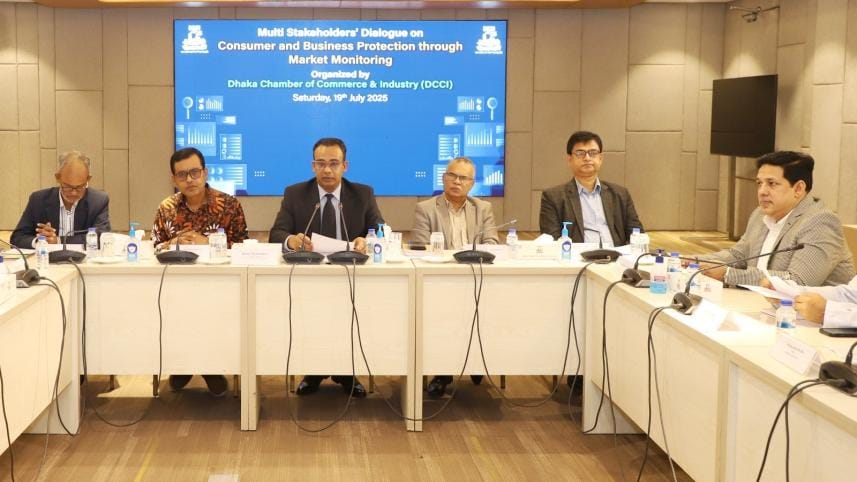Poor monitoring causing commodity price hikes: businesses

Consumers, along with businesses, are suffering from sudden hikes in essential commodity prices due to the absence of effective market supervision, artificial crises, extortion, insecurity in goods transportation, and complexities in the import process, analysts said today.
A lack of storage facilities, distrust between traders and consumers, and a lack of fair competition in the market are other contributing factors, they said.
They made the comments at a multi-stakeholder dialogue on consumer and business protection through market monitoring, organised by the Dhaka Chamber of Commerce and Industry (DCCI) at its office in the capital today.
Despite the country's growing economic activities, consumers—especially small enterprises—are facing constant challenges, said Razeev H Chowdhury, acting president of the DCCI.
Price manipulation, artificial crises, poor product quality, regulatory complexities, and market harassment are eroding consumer confidence and hurting ethical businesses, he said.
To deal with the prevailing situation, he emphasised the formulation and effective implementation of an integrated framework for market supervision and the creation of an accountable and competitive market monitoring system.
Mohammed Alim Akhter Khan, director general of the Directorate of National Consumers' Right Protection (DNCRP), said effective market supervision is very important.
The DNCRP covers all 64 districts of the country, but there are no officers at all in 19 of the offices, he said.
The market is witnessing high prices, especially for essential commodities, due to the presence of middlemen in the transportation of goods and market management, said Md Shahjahan Mia, administrator of Dhaka South City Corporation.
The reputation of ethical businesses is sometimes harmed due to a fraction of dishonest ones, he said.
Professor Mohammad Shoeb, member of the Bangladesh Food Safety Authority, said the market monitoring mechanism should adopt state-of-the-art technologies and use updated data for better results.
Once there were 18 government sugar mills, but now most of them are no longer operational, said Mohammad Golam Mowla, general secretary of the Moulvibazar Traders Association.
The number of edible oil refineries is gradually decreasing, resulting in uneven competition in essential products due to increasing dependence on a few importers, he added.
Khandaker Monir Ahmed, senior vice president of the Bangladesh Poultry Industries Association, suggested establishing storage facilities for eggs in the country so they can be consumed at lower prices during the peak season.
Abul Hashem, president of the Sugar and Oil Traders Association, urged the government to reopen the closed sugar mills, either under a government initiative or in collaboration with the private sector.
The reopening of the sugar mills will help reduce import dependence, ensure fair competition in the market, and create employment opportunities, he said.
Imposing fines is not enough to curb unethical activities in the market; rather, exemplary punishments are needed to bring discipline, said Kazi Mohammad Bashir Uddin, president of the Moulvibazar Traders' Association.



 For all latest news, follow The Daily Star's Google News channel.
For all latest news, follow The Daily Star's Google News channel.
Comments